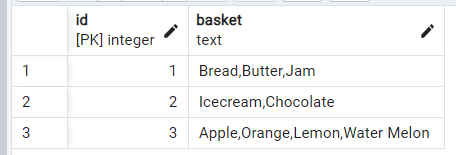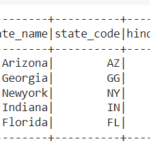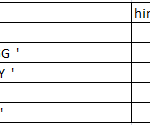The string_to_array() function in PostgreSQL is used to split a string into an array based on a specified delimiter. This function is useful for breaking down a string into its components and storing them as elements of an array.
Some of tasks that can be accomplished by using string_to_array() function include
- Split String to Array by Comma in PostgreSQL
- Split String to Array by space in PostgreSQL
- Split String to Array by hyphen in PostgreSQL
Syntax – string_to_array() function in PostgreSQL
string_to_array(string text, delimiter text)
- string: The input string to be split into an array.
- delimiter: The delimiter used to split the string.
Split String to Array by Comma
SELECT string_to_array('Mercury,Venus,Earth,Mars', ',');
Explanation: Splits the string ‘Mercury,Venus,Earth,Mars’ into an array with ‘Mercury’, ‘Venus’, ‘Earth’ and ‘Mars’ as elements.
Output:
Split String to array by Space
SELECT string_to_array('Hello PostgreSQL Enthusiast', ' ');
Explanation: Splits the string ‘Hello PostgreSQL Enthusiast’ into an array with each word separated by commas
Output:
Split String to array by Dash / hyphen
SELECT string_to_array('20-AUG-2024', '-');
Explanation: Splits the string ’20-AUG-2024′ into an array with each element separated by Dash or hyphen
Output:
Split String to array on a Column in PostgreSQL:
You can use string_to_array() function to split the values of a column in a table into arrays.
Let’s use the table name “orders_items”
You can use string_to_array() function to split the basket column into arrays as shown in the below code
SELECT *, string_to_array(basket, ',') AS basket_array FROM orders_items;
- basket column is split into arrays by and stored as a new column named “basket_array”.
Output:
Accessing Array Elements in PostgreSQL:
Once you have an array, you can access its elements using array indexing. PostgreSQL arrays are 1-based, meaning the first element is at index 1.
Example: To Access First Element of the Array, First convert the “basket” column from string to array using string_to_array() function and then get the first element by indexing first element
SELECT *, (string_to_array(basket, ','))[1] AS first_item FROM orders_items;
Output:
Example: Access Last Element of the Array, First convert the “basket” column from string to array using string_to_array() function and then get the last element by using array_length() function as shown below
SELECT *, (string_to_array(basket, ',')) [array_length(string_to_array(basket, ','),1)] AS last_item FROM orders_items;
Output:
Example: Count Number of Items
You can use the cardinality() function to count the number of items in the array. First convert the “basket” column from string to array using string_to_array() function and then count the number of elements in array using cardinality() function as shown below
SELECT *, cardinality(string_to_array(basket, ',')) AS item_count FROM orders_items;
Output:












